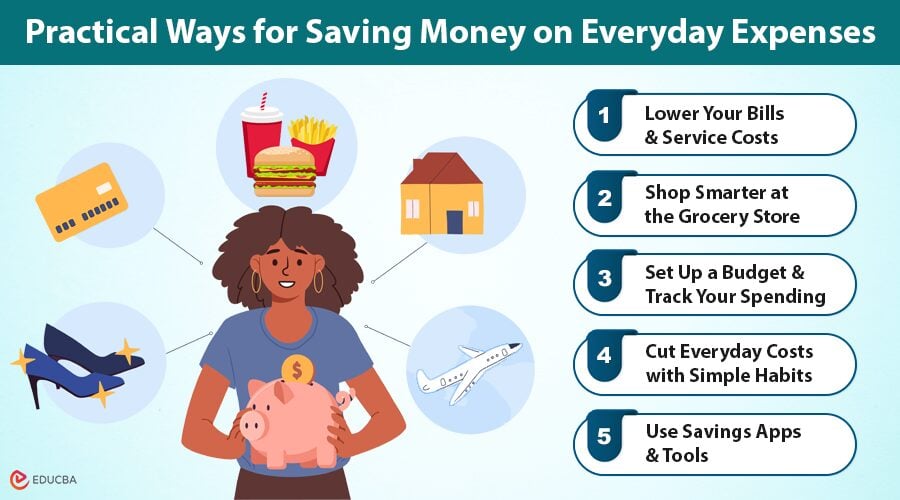
Take Control of Your Finances
Saving money on everyday expenses is not as difficult as it may seem. With a few thoughtful strategies, you can make significant cuts to your bills, reduce unnecessary spending, and increase your savings over time. By following these straightforward and effective tips, you can cut down on everyday expenses and take charge of your financial future.
Practical Ways for Saving Money on Everyday Expenses
Saving money does not have to be complicated. You can save a lot of money over time by making some small changes to your everyday habits. Here are some practical ways to cut costs and keep more money in your pocket.
#1. Lower Your Bills and Service Costs
One of the easiest ways to save money is by lowering your monthly bills. Start by comparing your service providers with others in the market. Give your current provider a call and ask for a better deal. If they are not willing to help, ask to speak with a supervisor. Sometimes, mentioning that you might switch to another company can help you get a discount.
Also, check your bills for mistakes or hidden fees. A quick phone call could fix errors costing you extra money. Consider downgrading if you are paying for services you do not need, like extra TV channels or premium internet speeds. You can also save by bundling services like internet, phone, and cable together, which often comes with a discount. To improve your financial management even further, seek the advice of the best financial planners in Melbourne. They can help you create a customized plan that aligns with your long-term goals.
#2. Shop Smarter at the Grocery Store
Grocery shopping can add up quickly, but there are ways to cut down on costs. First, plan your meals for the week and make a list of the ingredients you need. Check your pantry to avoid buying items you already have. This will help you avoid buying things on impulse and reduce food waste. At the store, stick to the outside aisles where fresh produce and other unprocessed foods line the shelves. Avoid the middle aisles, which often have processed and more expensive items. Look for store sales and use coupons whenever possible. Many stores offer loyalty programs or cashback apps that can help you save.
Purchase items in bulk, particularly non-perishable products, and choose store brands over name brands. They are often just as good and much cheaper. Also, focus on buying seasonal produce, as it is typically fresher and cheaper. To stay on track, use a calculator or budgeting app while shopping to monitor how much you are spending.
#3. Set Up a Budget and Track Your Spending
A solid budget is essential for saving money. Start by tracking your income after taxes and reviewing your spending for a few weeks to see where your money is going. You can monitor your expenses using an app, a spreadsheet, or simply pen and paper.
When reviewing your spending, divide it into fixed costs (like rent or utilities) and variable costs (like groceries or entertainment). This helps you see where you can cut back. Set realistic financial goals and focus on your needs rather than wants. Several budgeting methods, like zero-based budgeting or the envelope system, can help you stay organized and on track. Consistency is key, so make budgeting a habit and review it regularly.
#4. Cut Everyday Costs with Simple Habits
Once you have a budget, consider ways to cut your daily costs. Here are some simple changes you can make:
- Meal planning: Make a weekly food plan ahead of time and only buy what you need. This reduces food waste and prevents you from buying unnecessary items.
- Buy in bulk: Purchase items you use regularly in larger quantities to save money in the long run.
- Entertainment on a budget: Instead of expensive outings, look for free community events or visit libraries and parks. If you love the movies or concerts, check for discounts or special days when tickets are cheaper.
- Transportation: You can save on gas and car maintenance by carpooling, biking, or using public transportation instead of driving alone.
- Reduce utility bills: Save on electricity and water by turning off lights when you leave a room, fixing leaks, and unplugging electronics you are not using.
#5. Use Savings Apps and Tools
Technology makes saving money easier than ever. Use apps to track and optimize your spending. For example, Qapital rounds up your purchases to the closest dollar, which lets you save more change. Rocket Money helps you find and cancel unused subscriptions so you do not pay for services you do not need.
Apps like Toshl Finance allow you to categorize your expenses and clearly understand where your money is going. YNAB (You Need A Budget) helps you create a budget by giving every dollar a purpose. If you want a more hands-off approach, Level can help estimate how much you can spend each day and automatically save money for you.
Final Thoughts
Saving money on everyday expenses is all about making small, consistent changes. You can easily reduce your expenses by trimming your bills, shopping smarter, setting up a budget, and using apps to track your spending. It does not require drastic lifestyle changes—just a few mindful habits can go a long way in improving your financial situation. Remember to apply the 24-hour rule before making impulse purchases—it helps you think twice. Embrace savings challenges to keep your motivation high, and watch your financial freedom grow!
Recommended Articles
We hope this guide to saving money on everyday expenses helps you discover practical strategies for cutting costs without compromising your lifestyle. Check out these recommended articles for more tips on budgeting and making the most of your resources.

